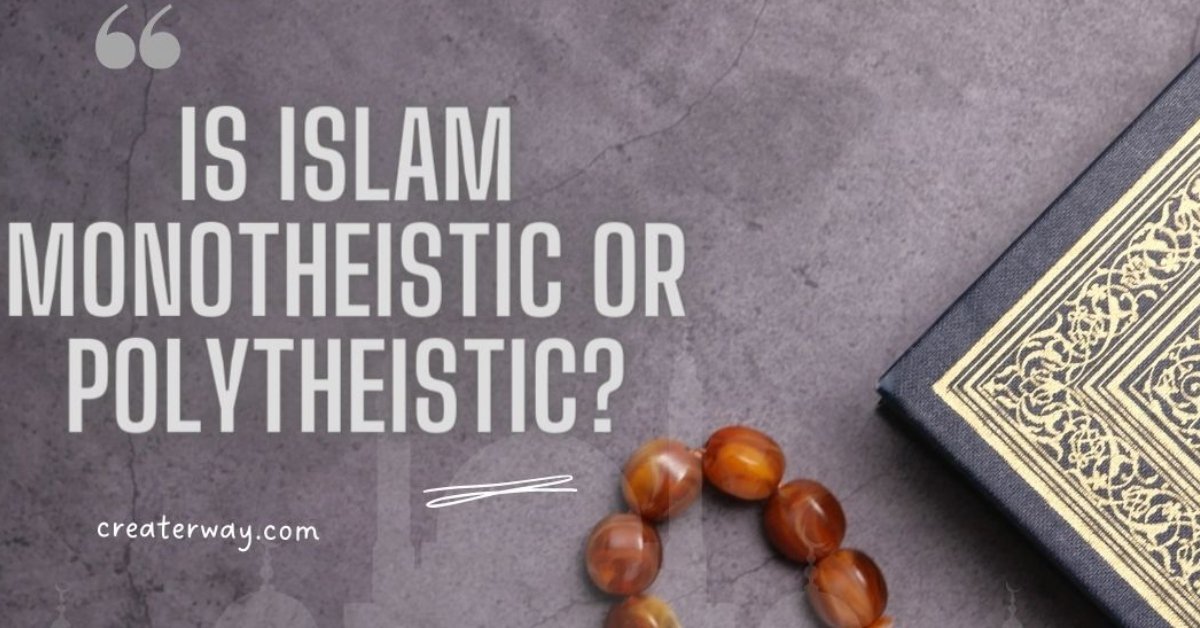RELIGIOUS
IS ISLAM MONOTHEISTIC OR POLYTHEISTIC?

Is Islam monotheistic or polytheistic?Before we delve into the question of whether Islam is monotheistic or polytheistic. And Islam important to define of what these terms mean. Monotheism is the belief in a single, all-powerful God who is the creator of the universe and everything in it. Polytheism , on the other hand, is the belief in multiple gods. And goddesses who each have their distinct powers and personalities.
ISLAM MONOTHEISTIC OR POLYTHEISTIC
Islam and Monotheism:
The Concept of Tawhid
Islam is undoubtedly a monotheistic religion. The concept of Tawhid, or the oneness of God, is central to the Islamic faith. Muslims believe in one God, known as Allah, who is omnipotent, omniscient, and benevolent. They also believe that there is no God but Allah and that he has no partners, associates, or equals.
The concept of tawhid is mentioned repeatedly throughout the Quran, the holy book of Islam. For example, in Surah Al-Ikhlas, the Quran states, “Say: He is Allah, the One and Only; Allah, the Eternal, Absolute; And he begetteth not, nor is He begotten; And there is none like unto Him.” This verse emphasizes the idea that Allah is the only God.And that he has no sons or daughters. And which is a common belief in many polytheistic religions.
Islam and Polytheism:
The Role of Idolatry
While Islam is undoubtedly a monotheistic religion. And there have been instances throughout history where Muslims have engaged in practices that could be considered polytheistic. One such practice is idolatry, which involves the worship of statues, images, or other physical objects as gods or goddesses.
Idolatry is explicitly forbidden in Islam, as it goes against the concept of tawhid. The Prophet Muhammad spent much of his life fighting against idolatry and promoting the worship of Allah alone. In the Quran, Allah says, “Say, ‘Indeed, my Lord has guided me to a straight path – a correct religion. And the way of Abraham, inclining toward truth. And he was not among those who associated others with Allah.'”
Islam and the Concept of Shirk:
What is Shirk in Islam?
The idea of shirk, or associating partners with Allah, is another important concept in Islam. Muslims believe that shirk is one of the greatest sins that a person can commit.And it goes against the fundamental principle of tawhid. Shirk can take many forms, including idolatry, the veneration of saints. Because or the attribution of divine qualities to human beings or other entities. For example, attributing prophethood or divine status to a human being.And such as the belief held by some groups that the Prophet Muhammad was divine, would be considered shirk.
In the Quran, Allah warns against the sin of shirk, saying, “Verily, Allah forgives not that partners should be set up with Him in worship, but He forgives except that (anything else) to whom He wills; and whoever sets up partners with Allah in worship, he has indeed invented a tremendous sin.”
The Influence of Pre-Islamic Arabian Culture:
Role and status
It’s worth noting that the pre-Islamic Arabian culture that existed before the advent of Islam was polytheistic, with many gods and goddesses worshiped in various forms. The Kaaba, the ancient shrine in Mecca that is now the holiest site in Islam, was originally a center of polytheistic worship, with idols representing various deities placed inside. When the Prophet Muhammad began preaching the message of Islam, he faced significant opposition from the polytheistic leaders of Mecca, who saw his message as a threat to their way of life. It was only after the Prophet’s victory in the Battle of Badr in 624 CE that Islam began to gain a foothold in the Arabian Peninsula.
The Influence of Monotheistic Religions:
Quranic References to Judaism and Christianity
Another factor that may have influenced the development of Islam as a monotheistic religion is the presence of other monotheistic religions in the region. Christianity and Judaism, for example, were present in Arabia at the time of the Prophet Muhammad and may have influenced his belief in the concept of a single, all-powerful God. The Quran references both Christianity and Judaism and recognizes them as legitimate monotheistic religions. Muslims believe that Islam represents the final and most complete revelation of God’s message to humanity, but they also recognize the commonalities between Islam and these other faiths.

















